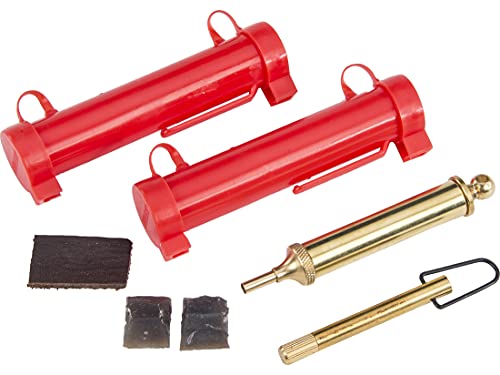-
Friends, our 2nd Amendment rights are always under attack and the NRA has been a constant for decades in helping fight that fight.
We have partnered with the NRA to offer you a discount on membership and Muzzleloading Forum gets a small percentage too of each membership, so you are supporting both the NRA and us.
Use this link to sign up please; https://membership.nra.org/recruiters/join/XR045103
You are using an out of date browser. It may not display this or other websites correctly.
You should upgrade or use an alternative browser.
You should upgrade or use an alternative browser.
Beeswax source
- Thread starter mjac
- Start date

Help Support Muzzleloading Forum:
This site may earn a commission from merchant affiliate
links, including eBay, Amazon, and others.
Try fabric shops,
Ladies use Bees wax to gather/pointing thread before stuffin it in a needle
Ladies use Bees wax to gather/pointing thread before stuffin it in a needle
Welcome to the fire! :thumbsup: Tandy Leather sells bees wax in small amounts like 1 oz. blocks. What part of Florida? I know of a place in Homestead you can get a lifetime supply for about 20 bucks. Are you in Fl. or Tn now? :idunno:

$11.99
$13.01
Traditions Performance Firearms Muzzleloader Stainless #11 Nipples with M6x1threads - 2 per - for Traditions and CVA rifles and pistols
National Hardware Supply

$11.99
$13.01
Traditions Performance Firearms Muzzleloader Stainless #11 Nipples with M6x1threads - 2 per - for Traditions and CVA rifles and pistols
National Hardware Supply

$15.99
Muzzle-Loaders Wooden Black Powder Muzzleloader Bullet and Sabot Starter - 6 Jags
IX Properties
Billnpatti
Cannon
- Joined
- Aug 11, 2008
- Messages
- 7,340
- Reaction score
- 44
Many great suggestions here. If all else fails, you can check a candle shop. Some of them sell bees wax candles. Not cheap but all you need is one candle. I think most Hobby Lobby stores have bees wax in small 1 oz. cakes. Look in either the candle making supplies or in the sewing section or better yet, ask a sales clerk where it is. If you end up needing a greater amount, look in your phone book for Bee Keepers.
Thanks guys, I appreciate the suggestions!
I have been to Jo Ann fabrics and Michaels, neither had any.
I am in west central Florida now but heading to east Tennessee early next week and was hoping to have a brew to take with me.
There is a Hobby Lobby near me. I'll check them out in the am.
I have been to Jo Ann fabrics and Michaels, neither had any.
I am in west central Florida now but heading to east Tennessee early next week and was hoping to have a brew to take with me.
There is a Hobby Lobby near me. I'll check them out in the am.
poordevil
50 Cal.
- Joined
- Feb 17, 2008
- Messages
- 1,251
- Reaction score
- 8
Last edited by a moderator:
I know the Tandy Leather in Ft. Lauderdale had it. You can goggle them up and have them mail you some if need be. There may be a Tandy along your way to Tn. I know there is one in Chattanooga. What part of East Tn. are you going too?
If you are going north via 75 turn off at the Don Gartlets (SP?) Car Museum exit and go east toward Bellview for a couple of miles. There is a ranch on the south side of the hwy. that kept bees and sold honey and beeswax a couple of years ago.
I can't remember how much it was, but I do remember it was pretty cheap.
I can't remember how much it was, but I do remember it was pretty cheap.
zimmerstutzen
70 Cal.
- Joined
- Apr 2, 2009
- Messages
- 5,848
- Reaction score
- 1,215
Try cutting cheese wax with some olive oil.(you have to melt it first) Works pretty well as a patch lube and lube for BPCR
chawbeef
40 Cal.
Is there anything wrong with using a wax toilet bowl gasket?? I mixed some of that with an equal amount of Dubbin to water proof a hunting pouch.....................Boog
paulvallandigham
Passed On
- Joined
- Jan 9, 2006
- Messages
- 17,537
- Reaction score
- 89
Every county in the USA has a USDA office. That office keeps data on all farming operations, including beekeeping. Call the office and get the names, addresses and phone numbers for your local beekeepers. Contact them directly. They can use the money. If you tell them you are willing to filter the wax yourself, you can probably negotiate a cheaper price for raw beeswax. You also will make a new friend and source for obtaining honey made locally. :grin: :thumbsup:
To filter, heat the wax in a double boiler arrangement until it melts, and pour the hot wax through a stainer, in which you put coffee filters. Put the strainer over a bowl to catch the clean wax- free of dirt, bee wings, and other body parts. Then, reheat the cleaned wax and pour it into muffin tins, lined first with "cupcake" papers. You can make the "cakes" as thick or as thin as you want. Its the cakes that can them be remelted, or shaved, or cut into pieces to mix as little or as much lube as you desire. :hmm:
You don't need expensive equipment to have a "double-boiler". Just put the pan or tin you have to hold the raw wax in a frying pan, with enough water in the frying pan to cover up about 2/3 of the sides of you pan or tin.
All a double boiler does is hold the temperature of the molten wax down to no more than the boiling temperature of water-212 Degrees F.--- so the wax does not get so hot it bursts into flames on you. A double boiler is a safety device to protect you, and anyone around you, when you melt the wax. :hmm: :hatsoff:
USE IT.
OH, the enzymes in honey make it the one food in the world that will NOT SPOIL. These enzymes are also in beeswax. Unlike paraffin wax, beeswax will not form a layer of mold on it over time. Honey has been used for ages to fight off bacterial infections, such as those found in "sore" throats. A teaspoon of honey eaten directly, as needed, or mixed with tea, will help coat the throat and destroy the bacteria that is causing the infection and sore throat. Beeswax mixed with vegetable oils for patch lubes, protects the fabric from bacteria "rot" during storage. :shocked2: :hmm: :thumbsup:
To filter, heat the wax in a double boiler arrangement until it melts, and pour the hot wax through a stainer, in which you put coffee filters. Put the strainer over a bowl to catch the clean wax- free of dirt, bee wings, and other body parts. Then, reheat the cleaned wax and pour it into muffin tins, lined first with "cupcake" papers. You can make the "cakes" as thick or as thin as you want. Its the cakes that can them be remelted, or shaved, or cut into pieces to mix as little or as much lube as you desire. :hmm:
You don't need expensive equipment to have a "double-boiler". Just put the pan or tin you have to hold the raw wax in a frying pan, with enough water in the frying pan to cover up about 2/3 of the sides of you pan or tin.
All a double boiler does is hold the temperature of the molten wax down to no more than the boiling temperature of water-212 Degrees F.--- so the wax does not get so hot it bursts into flames on you. A double boiler is a safety device to protect you, and anyone around you, when you melt the wax. :hmm: :hatsoff:
USE IT.
OH, the enzymes in honey make it the one food in the world that will NOT SPOIL. These enzymes are also in beeswax. Unlike paraffin wax, beeswax will not form a layer of mold on it over time. Honey has been used for ages to fight off bacterial infections, such as those found in "sore" throats. A teaspoon of honey eaten directly, as needed, or mixed with tea, will help coat the throat and destroy the bacteria that is causing the infection and sore throat. Beeswax mixed with vegetable oils for patch lubes, protects the fabric from bacteria "rot" during storage. :shocked2: :hmm: :thumbsup:
Boog, I tried some toilet bowl wax and olive oil many years ago, cuz I didn't know any better. It did ok, I guess, but later I found out that the wax is made out of polysomethingorother, not organic at all. It has the potential to leave burned crud in the bore. I still have a tub of it, and when compared to olive oil and beewax mix, the toilet stuff acts sticky and stringy, like melted cotton candy. Maybe because it's 20 years old, but I know the beeswax lube will still be good after that long. Bill
I get it at my Local Gun show. A fella sells it in different size blocks..if you can't find any PM me and Ill get ya some the first weekend of April. It's not expensive at all..but I can see how it might be hard getting it in different parts of the country.


















